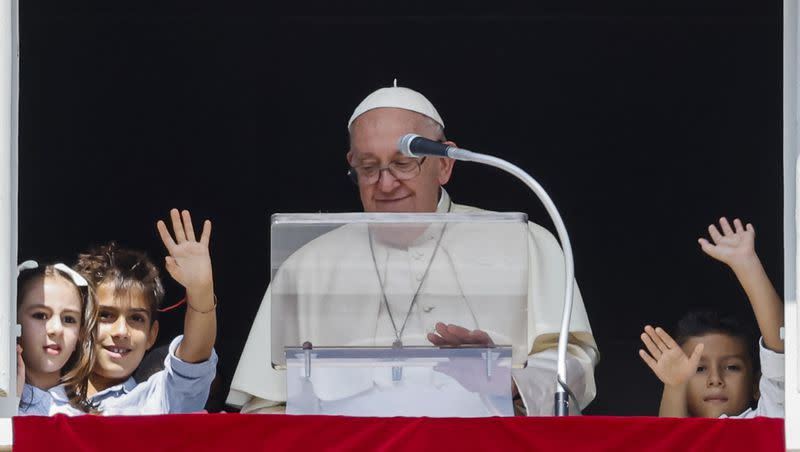The pope’s latest comments on same-sex marriage, explained

- Oops!Something went wrong.Please try again later.
Ahead of a major meeting of Catholic leaders about the future of their church, Pope Francis has once again shown that he’s full of surprises.
In a now-public letter penned in early July, the pope unexpectedly signaled that he’s open to the possibility of priests blessing same-sex unions. He also suggested that more research could be done about ordaining female priests, according to The Washington Post.
“We cannot be judges who only deny, push back and exclude,” Pope Francis wrote about blessing same-sex couples. “As such, pastoral prudence must adequately discern whether there are forms of blessing, requested by one or several people, that do not convey a wrong idea of a matrimony. Because when one seeks a blessing, one is requesting help from God.”
Related
What has the pope said about same-sex marriage?
The pope’s new comments may fit with his past reflections on reserving judgment — he famously said “Who am I to judge?” about the idea of condemning gay priests in 2013 — but they contradict his recent criticism of Catholic leaders in Germany who are already blessing same-sex unions.
“Pope Francis has reprimanded Germany’s Catholic leadership. He quipped to the head of its bishops’ conference last year that Germany already had one protestant church — ‘We don’t need two,’” The Washington Post reported.
A few months later, the pope said that, while homosexuality should not be criminalized, it remains sinful in the eyes of the church, as the Deseret News previously reported.
“It’s not a crime. Yes, but it’s a sin,” Pope Francis told The Associated Press in January.
Catholic teachings on marriage
In general, Pope Francis has adopted a welcoming attitude toward the LGBTQ community even as he’s kept traditional Catholic teachings on marriage in place, The Associated Press reported at the time.
In the newly released letter, the pope does not call for the church to rethink its position on marriage. Instead, he affirms that, in the church’s eyes, marriage is an “exclusive stable and indissoluble union between a man and a woman, naturally open to conceiving children,” according to Catholic News Service.
“The Church avoids all kinds of rites or sacramentals that could contradict this conviction and imply that it is recognizing as a marriage something that is not,” he wrote.
In other words, the pope does not call for a full embrace of Germany’s approach to blessing same-sex unions. He instead talks about how such blessings might sometimes be an appropriate expression of pastoral charity.
“Pastoral prudence must adequately discern if there are forms of blessing, solicited by one or various persons, that don’t transmit a mistaken concept of marriage,” Pope Francis wrote.
What is the Synod on Synodality?
The pope’s new letter was written to a group of theologically conservative church leaders who had asked him to affirm that the church remains opposed to homosexuality and women priests.
Instead of doing what they’d asked, he reflected on the possibility of change.
“Francis’ response to the cardinals ... marks a reversal from the Vatican’s current official position,” The Associated Press reported.
The retired cardinals, who have a contentious relationship with Pope Francis, were likely seeking to stir up debate and heighten anxiety ahead of a three-week meeting at the Vatican on the future of the church, according to the AP.
The meeting, called the Synod on Synodality, begins Wednesday.
“Conservatives fear the synod process will open what they see as a Pandora’s box, eventually leading to unprecedented change on priestly celibacy, the acceptance of homosexuality and the elevation of women in a historically patriarchal church,” The Washington Post reported.
But Pope Francis and other Vatican leaders have urged critics to calm down, noting that the meeting is a chance for Catholics from around the world to get to know one another and reflect on their faith, not to enact controversial proposals.

